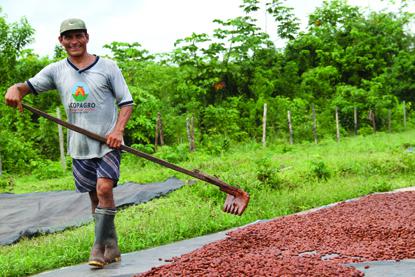Co+op Forest

During a recent national meeting of our 134 member and associate co-ops, National Cooperative Grocers Association (NCGA) unveiled the Co+op Forest—a unique new program that offsets carbon emissions associated with NCGA’s air travel. Co+op Forest is the tangible result of NCGA’s efforts to further our sustainability goals using a full-circle supply chain solution.
In partnership with the international collective Pur Projet, NCGA funds farmers (the same ones who supply retail co-ops with fair trade chocolate) to plant native trees that, over their lifetime, will absorb enough carbon to compensate for the carbon emitted by our air travel. Co+op Forest’s first seedlings were planted in the summer of 2013 and will grow along the Alto Huayabamba River in a formerly deforested region of northern Peru. NCGA is proud to be Pur Projet’s first U.S. partner to plant trees as part of this innovative program.
A carbon offset program
At its “roots,” the Co+op Forest is a carbon offset program to slow climate change. Even environmentally responsible businesses such as co-ops contribute to the problem of climate change. According to the Environmental Protection Agency, transportation accounts for 31 percent of carbon dioxide emissions, with air travel being the most carbon-intensive mode. NCGA conducts business virtually whenever feasible, but as a member services organization spanning 37 states, air travel is often essential.
NCGA co-ops rely on face-to-face interaction for trainings, meetings, advocacy work and peer networking. In a typical year, NCGA staff (plus co-op staff with air travel reimbursed by NCGA) log approximately 2.5 million air miles, emitting roughly 450 tons of carbon dioxide into the atmosphere. Many organizations our size address their carbon footprint by purchasing carbon “credits” and trading them on the open market. However, NCGA chose to neutralize our carbon footprint in a more meaningful and lasting way—by growing a sustainable forest in Peru.
Integrity leads to innovation
In 2012, NCGA CEO Robynn Shrader visited Peru, where she met with local farmers and witnessed firsthand the benefits of Pur Projet’s reforestation efforts. Pur Projet facilitates more than a dozen reforestation programs around the world, but Co+op Forest marks the first time a U.S. organization has partnered with Pur Projet to plant trees.
Co+op Forest is part of the Alto Huayabamba Project, which promotes sustainable agroforestry among 1,800 small-scale indigenous farmers associated with the ACOPAGRO cacao cooperative. ACOPAGRO was initially funded as part of a United Nations program. The U.N. established ACOPAGRO in 1994 in an effort to shift farming away from the production of coca, used for cocaine in the illicit drug trade. Coca growers used “slash and burn” methods to clear the land, contributing heavily to deforestation in the area.
As a result of the ACOPAGRO cooperative’s focus on sustainable agroforestry, it is fostering social and environmental recovery in the region. Today, ACOPAGRO sells organic cacao at fair trade prices, allowing the cooperative to invest in equipment, training, medical services, and education for farm families. In July 2012, ACOPAGRO won first place for quality in Peru’s national cacao competition—demonstrating that sustainable agroforestry can be as good for tastebuds as it is for people and the environment.
In collaboration with Pur Projet and ACOPAGRO, Co+op Forest is helping a community heal, reforesting a vulnerable landscape, and producing some tasty organic chocolate, all while encouraging sustainable farming techniques and slowing global climate change.
A full circle system
Pur Projet founders Tristan Lecomte and Mathieu Senard also pioneered the fair trade company Alter Eco, which supplies many of our member and associate co-ops with rice, quinoa, chocolate, and sugar. Expanding upon the fair trade ethos, Pur Projet provides the research, accreditation, and on-the-ground connections necessary to create an effective carbon-offset program based upon farmer-supported reforestation.
Pur Projet refers to this unique take on offsetting as “insetting,” since the programs they develop encourage organizations to regenerate ecosystems within their own supply chain. Co+op Forest exemplifies a comprehensive, full-circle approach to addressing climate change in these ways:
- In the Peruvian rainforest ecology, Pur Projet estimates that it takes three trees planted and maintained for 40 years to remove one ton of carbon dioxide—a greenhouse gas—from the atmosphere. NCGA funds Pur Projet based on our air travel-related carbon emissions. In 2013, NCGA funded the planting of 1,404 native capirona and -paliperro trees to offset our 2012 carbon emissions of 467.8 tons.
- Pur Projet pays ACOPAGRO farmers to plant and maintain Co+op Forest’s trees using sustainable agroforestry methods.
- In return, native trees benefit the land and farmers. The capirona tree grows to 100 feet tall, producing rainforest habitat and medicinal bark. Another tree, the paliperro, yields edible fruit. Both varieties provide the shade necessary to grow healthy cacao plants.
- ACOPAGRO sells its award-winning, organic cacao to fair trade companies such as Alter Eco and Equal Exchange, which in turn provide retail grocery co-ops with quality chocolate.
Growing the future
When the Co+op Forest matures, it will remove more than 400 tons of carbon dioxide from the atmosphere, a number that will grow with each new tree planted. As we look forward to a future of productive national meetings and other important travel-dependent work, NCGA will not only be growing the cooperative movement, but a sustainable forest as well. NCGA is providing member and associate co-ops with resources to help them share the Co+op Forest story with staff and shoppers.
To learn more about Pur Projet and take in some gorgeous Peruvian scenery, visit www.purprojet.com/en/project/alto-huayabamba.







